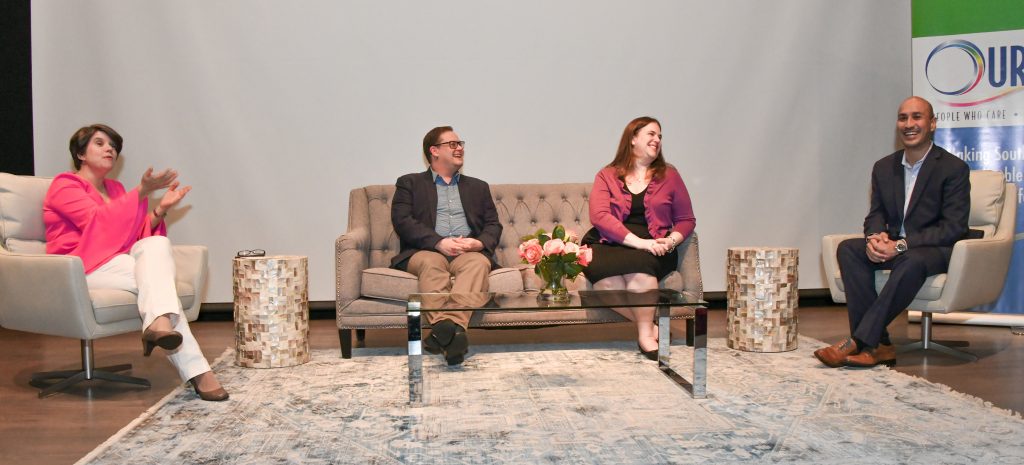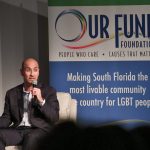This Law Group is Providing a 'Playbook for Resistance in the Time of Trump'
Our Fund Foundation, a South Florida philanthropy group, partnered with Lambda Legal for the eighth annual Fall LGBTQ Leadership Forum in Fort Lauderdale Monday night. Panelists discussed the rise of hard-right judicial appointees to the federal bench, and securing legal victories for queer clients in a time of immense uncertainty.
November 13, 2018 at 03:33 PM
5 minute read
 (Left to right) Sharon McGowan, Ethan Rice, Karen Loewy, and Paul Castillo with Lambda Legal. Photo: Steven Shires Photography
(Left to right) Sharon McGowan, Ethan Rice, Karen Loewy, and Paul Castillo with Lambda Legal. Photo: Steven Shires Photography
Top LGBTQ attorneys are speaking out on how the Trump administration has forced them to rethink where they file complaints and how they engage with the justice system.
On Monday, roughly 200 litigators and advocates representing lesbian, gay, bisexual and transgender communities gathered at the NSU Art Museum's Horvitz Auditorium in Fort Lauderdale for the eighth annual Fall LGBTQ Leadership Forum. The panel was hosted by South Florida-based and LGBTQ-oriented philanthropy group, Our Fund Foundation, in partnership with Lambda Legal, the oldest LGBTQ legal advocacy group in the United States.
The discussion, led by Lambda Legal's chief strategy officer and legal director Sharon McGowan, centered around the civil rights organization's strategy for achieving legal victories during — as the forum referred to it — “The Time of Trump.”
Two years into President Donald Trump's tenure, many of the federal agencies that sought to protect LGBTQ citizens from discrimination under the Obama administration have pulled back from their roles. Instead, the transgender military ban announced in March and the recently leaked Department of Health and Human Services memo on gender identity seem to illustrate that some agencies have lurched hostility toward individuals identifying as queer or homosexual.
 Paul Castillo, Lambda Legal, senior attorney and students' rights strategist. Photo: Steven Shires Photography
Paul Castillo, Lambda Legal, senior attorney and students' rights strategist. Photo: Steven Shires Photography“The federal government, a place where students turned to seek assistance, is sort of closed for business,” said Paul Castillo, Lambda Legal's senior attorney for the association's eight-state South Central Regional Office.
McGowan agreed.
“I think that the progress we experienced during the last administration created an expectation where people thought and came of age thinking the federal government had an obligation to protect them,” she said. “What we are experiencing now is a withdrawal of that protection and an abdication of that responsibility.”
McGowan and her fellow panelists said this shift has resulted in a reorientation of priorities for the organization and other LGBTQ groups. Rather than trying to secure protections and favorable verdicts on the federal level, social justice litigators have instead refocused on trial courts and in “being strategic about where we bring cases.”
“Sometimes we turn to state courts when federal courts become hostile or claims become more difficult to win,” she said, attributing these localized legal gains to states whose constitutional provisions “have more robust protections for equality and liberty.”
“We use that to build the garden … that will turn to progress on the federal level when we have more hospitable environments in which to work,” she continued. “Not as sexy as the big wins, but it's a really important part of preserving the playing field to make sure we have the ability to continue to make progress going forward.”
Ethan Rice, a former child welfare attorney who serves as Lambda's Fair Courts Project attorney, said many recent of the LGBTQ community's recent legal gains have come from efforts to inform judges, prosecutors and larger legal groups about the realities of discrimination against queer people in the U.S.
 Ethan Rice, Lambda Legal, Fair Courts Project Attorney. Photo: Steven Shires Photography
Ethan Rice, Lambda Legal, Fair Courts Project Attorney. Photo: Steven Shires Photography“I've seen such an amazing change in the last three or four years,” he said. According to Rice, most judges and prosecutor in the past would not have raised their hands when asked if they'd worked with LGBT groups. But things have changed.
“Now at least half of people raise their hand when asked about working with LGBT youth,” Rice said, adding that a multiyear push to educate the court system has been “a successful project.”
“Trial level judges are interacting with our community the most,” Rice added, noting that trial judges are likely to ascend to the appellate bench down the line. “I'm hoping that by talking to judges at the trial level — as they are going to be hearing Lambda Legal cases perhaps later on in their career — they've had this education about LGBT issues.”
Speaking on Lambda Legal's July 2018 victory in their lawsuit against a Jacksonville school board for discriminating against transgender teen Drew Adams, the panelists affirmed the importance of humanizing their clients by sharing their stories. McGowan said she knew the organization's legal team “moved the needle” when hearing the judge presiding over Adams' case deliver his ruling.
“You can hear the voice of the judge talking about this young man and this judge was changed,” she said. “He now knows something that he did not know before, and he knew it because [Castillo] and all the amazing lawyers from Lambda and our co-counsel … shared that story and changed it from an abstract legal issue into a story about this young man and his ability to go to school.”
This content has been archived. It is available through our partners, LexisNexis® and Bloomberg Law.
To view this content, please continue to their sites.
Not a Lexis Subscriber?
Subscribe Now
Not a Bloomberg Law Subscriber?
Subscribe Now
NOT FOR REPRINT
© 2025 ALM Global, LLC, All Rights Reserved. Request academic re-use from www.copyright.com. All other uses, submit a request to [email protected]. For more information visit Asset & Logo Licensing.
You Might Like
View All
LSU General Counsel Quits Amid Fracas Over First Amendment Rights of Law Professor
7 minute read

Lawyers' Phones Are Ringing: What Should Employers Do If ICE Raids Their Business?
6 minute read
Trending Stories
- 1DC Circuit Keeps Docs in Judge Newman's Misconduct Proceedings Sealed
- 2Litigators of the Week: US Soccer and MLS Fend Off Claims They Conspired to Scuttle Rival League’s Prospect
- 3Litigator of the Week Runners-Up and Shout-Outs
- 4U.S.- China Trade War: Lawyers and Clients Left 'Relying on the Governments to Sort This Out'
- 5Willkie Adds Five-Lawyer Team From Quinn Emanuel in Germany
Who Got The Work
J. Brugh Lower of Gibbons has entered an appearance for industrial equipment supplier Devco Corporation in a pending trademark infringement lawsuit. The suit, accusing the defendant of selling knock-off Graco products, was filed Dec. 18 in New Jersey District Court by Rivkin Radler on behalf of Graco Inc. and Graco Minnesota. The case, assigned to U.S. District Judge Zahid N. Quraishi, is 3:24-cv-11294, Graco Inc. et al v. Devco Corporation.
Who Got The Work
Rebecca Maller-Stein and Kent A. Yalowitz of Arnold & Porter Kaye Scholer have entered their appearances for Hanaco Venture Capital and its executives, Lior Prosor and David Frankel, in a pending securities lawsuit. The action, filed on Dec. 24 in New York Southern District Court by Zell, Aron & Co. on behalf of Goldeneye Advisors, accuses the defendants of negligently and fraudulently managing the plaintiff's $1 million investment. The case, assigned to U.S. District Judge Vernon S. Broderick, is 1:24-cv-09918, Goldeneye Advisors, LLC v. Hanaco Venture Capital, Ltd. et al.
Who Got The Work
Attorneys from A&O Shearman has stepped in as defense counsel for Toronto-Dominion Bank and other defendants in a pending securities class action. The suit, filed Dec. 11 in New York Southern District Court by Bleichmar Fonti & Auld, accuses the defendants of concealing the bank's 'pervasive' deficiencies in regards to its compliance with the Bank Secrecy Act and the quality of its anti-money laundering controls. The case, assigned to U.S. District Judge Arun Subramanian, is 1:24-cv-09445, Gonzalez v. The Toronto-Dominion Bank et al.
Who Got The Work
Crown Castle International, a Pennsylvania company providing shared communications infrastructure, has turned to Luke D. Wolf of Gordon Rees Scully Mansukhani to fend off a pending breach-of-contract lawsuit. The court action, filed Nov. 25 in Michigan Eastern District Court by Hooper Hathaway PC on behalf of The Town Residences LLC, accuses Crown Castle of failing to transfer approximately $30,000 in utility payments from T-Mobile in breach of a roof-top lease and assignment agreement. The case, assigned to U.S. District Judge Susan K. Declercq, is 2:24-cv-13131, The Town Residences LLC v. T-Mobile US, Inc. et al.
Who Got The Work
Wilfred P. Coronato and Daniel M. Schwartz of McCarter & English have stepped in as defense counsel to Electrolux Home Products Inc. in a pending product liability lawsuit. The court action, filed Nov. 26 in New York Eastern District Court by Poulos Lopiccolo PC and Nagel Rice LLP on behalf of David Stern, alleges that the defendant's refrigerators’ drawers and shelving repeatedly break and fall apart within months after purchase. The case, assigned to U.S. District Judge Joan M. Azrack, is 2:24-cv-08204, Stern v. Electrolux Home Products, Inc.
Featured Firms
Law Offices of Gary Martin Hays & Associates, P.C.
(470) 294-1674
Law Offices of Mark E. Salomone
(857) 444-6468
Smith & Hassler
(713) 739-1250






